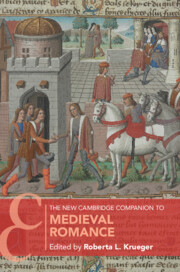Book contents
- The New Cambridge Companion to Medieval Romance
- The New Cambridge Companion to Medieval Romance
- Copyright page
- Contents
- Figures
- Contributors
- Acknowledgments
- Chronology
- Introduction
- 1 “For Love and For Lovers”
- 2 The Manuscript Contexts of Medieval Romance
- 3 Matters of Form
- 4 Authors, Narrators, and Their Stories in Old French Romance
- 5 Arthurian Transformations
- 6 Romance and the Medieval Mediterranean
- 7 The Crusading Romance in Britain
- 8 “Making Race” in Medieval Romance
- 9 The Construction and Interrogation of Gender in Old French Romance
- 10 Emotions as the Language of Romance
- 11 Medieval Iberian Romance
- 12 Medieval and Early Modern Italian Romance
- 13 German Medieval Romance
- 14 The Ends of Romance in Chaucer and Malory
- 15 French Romance in the Late Middle Ages and the Renaissance
- 16 Romance in Historical Context
- 17 Romance in Twentieth- and Twenty-First-Century Popular Culture
- Bibliography of Editions and Translations
- Index
- Cambridge Companions To …
- References
9 - The Construction and Interrogation of Gender in Old French Romance
Published online by Cambridge University Press: 11 May 2023
- The New Cambridge Companion to Medieval Romance
- The New Cambridge Companion to Medieval Romance
- Copyright page
- Contents
- Figures
- Contributors
- Acknowledgments
- Chronology
- Introduction
- 1 “For Love and For Lovers”
- 2 The Manuscript Contexts of Medieval Romance
- 3 Matters of Form
- 4 Authors, Narrators, and Their Stories in Old French Romance
- 5 Arthurian Transformations
- 6 Romance and the Medieval Mediterranean
- 7 The Crusading Romance in Britain
- 8 “Making Race” in Medieval Romance
- 9 The Construction and Interrogation of Gender in Old French Romance
- 10 Emotions as the Language of Romance
- 11 Medieval Iberian Romance
- 12 Medieval and Early Modern Italian Romance
- 13 German Medieval Romance
- 14 The Ends of Romance in Chaucer and Malory
- 15 French Romance in the Late Middle Ages and the Renaissance
- 16 Romance in Historical Context
- 17 Romance in Twentieth- and Twenty-First-Century Popular Culture
- Bibliography of Editions and Translations
- Index
- Cambridge Companions To …
- References
Summary
Focusing on the so-called “romances of adventure” (romans d’aventure) which made up the largest and most popular category of romances, this chapter provides representative glimpses of how complicated, and fluid, the presentation of gender is in romance. It primarily examines romances written in French because they were the earliest to be written and served as the model for most of those we find in other western European languages, as it explores how binaries such as passive/active and male/female were complicated by deliberate strategies on the part of authors (and patrons).
Keywords
- Type
- Chapter
- Information
- The New Cambridge Companion to Medieval Romance , pp. 135 - 149Publisher: Cambridge University PressPrint publication year: 2023

